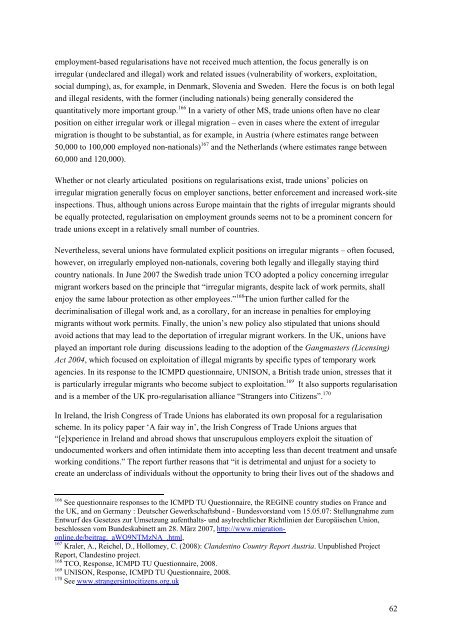REGINE Regularisations in Europe Final Report - European ...
REGINE Regularisations in Europe Final Report - European ...
REGINE Regularisations in Europe Final Report - European ...
You also want an ePaper? Increase the reach of your titles
YUMPU automatically turns print PDFs into web optimized ePapers that Google loves.
employment-based regularisations have not received much attention, the focus generally is on<br />
irregular (undeclared and illegal) work and related issues (vulnerability of workers, exploitation,<br />
social dump<strong>in</strong>g), as, for example, <strong>in</strong> Denmark, Slovenia and Sweden. Here the focus is on both legal<br />
and illegal residents, with the former (<strong>in</strong>clud<strong>in</strong>g nationals) be<strong>in</strong>g generally considered the<br />
quantitatively more important group. 166 In a variety of other MS, trade unions often have no clear<br />
position on either irregular work or illegal migration – even <strong>in</strong> cases where the extent of irregular<br />
migration is thought to be substantial, as for example, <strong>in</strong> Austria (where estimates range between<br />
50,000 to 100,000 employed non-nationals) 167 and the Netherlands (where estimates range between<br />
60,000 and 120,000).<br />
Whether or not clearly articulated positions on regularisations exist, trade unions’ policies on<br />
irregular migration generally focus on employer sanctions, better enforcement and <strong>in</strong>creased work-site<br />
<strong>in</strong>spections. Thus, although unions across <strong>Europe</strong> ma<strong>in</strong>ta<strong>in</strong> that the rights of irregular migrants should<br />
be equally protected, regularisation on employment grounds seems not to be a prom<strong>in</strong>ent concern for<br />
trade unions except <strong>in</strong> a relatively small number of countries.<br />
Nevertheless, several unions have formulated explicit positions on irregular migrants – often focused,<br />
however, on irregularly employed non-nationals, cover<strong>in</strong>g both legally and illegally stay<strong>in</strong>g third<br />
country nationals. In June 2007 the Swedish trade union TCO adopted a policy concern<strong>in</strong>g irregular<br />
migrant workers based on the pr<strong>in</strong>ciple that “irregular migrants, despite lack of work permits, shall<br />
enjoy the same labour protection as other employees.” 168 The union further called for the<br />
decrim<strong>in</strong>alisation of illegal work and, as a corollary, for an <strong>in</strong>crease <strong>in</strong> penalties for employ<strong>in</strong>g<br />
migrants without work permits. F<strong>in</strong>ally, the union’s new policy also stipulated that unions should<br />
avoid actions that may lead to the deportation of irregular migrant workers. In the UK, unions have<br />
played an important role dur<strong>in</strong>g discussions lead<strong>in</strong>g to the adoption of the Gangmasters (Licens<strong>in</strong>g)<br />
Act 2004, which focused on exploitation of illegal migrants by specific types of temporary work<br />
agencies. In its response to the ICMPD questionnaire, UNISON, a British trade union, stresses that it<br />
is particularly irregular migrants who become subject to exploitation. 169 It also supports regularisation<br />
and is a member of the UK pro-regularisation alliance “Strangers <strong>in</strong>to Citizens”. 170<br />
In Ireland, the Irish Congress of Trade Unions has elaborated its own proposal for a regularisation<br />
scheme. In its policy paper ‘A fair way <strong>in</strong>’, the Irish Congress of Trade Unions argues that<br />
“[e]xperience <strong>in</strong> Ireland and abroad shows that unscrupulous employers exploit the situation of<br />
undocumented workers and often <strong>in</strong>timidate them <strong>in</strong>to accept<strong>in</strong>g less than decent treatment and unsafe<br />
work<strong>in</strong>g conditions.” The report further reasons that “it is detrimental and unjust for a society to<br />
create an underclass of <strong>in</strong>dividuals without the opportunity to br<strong>in</strong>g their lives out of the shadows and<br />
166 See questionnaire responses to the ICMPD TU Questionnaire, the <strong>REGINE</strong> country studies on France and<br />
the UK, and on Germany : Deutscher Gewerkschaftsbund - Bundesvorstand vom 15.05.07: Stellungnahme zum<br />
Entwurf des Gesetzes zur Umsetzung aufenthalts- und asylrechtlicher Richtl<strong>in</strong>ien der Europäischen Union,<br />
beschlossen vom Bundeskab<strong>in</strong>ett am 28. März 2007, http://www.migrationonl<strong>in</strong>e.de/beitrag._aWQ9NTMzNA_.html,<br />
167 Kraler, A., Reichel, D., Hollomey, C. (2008): Clandest<strong>in</strong>o Country <strong>Report</strong> Austria. Unpublished Project<br />
<strong>Report</strong>, Clandest<strong>in</strong>o project.<br />
168 TCO, Response, ICMPD TU Questionnaire, 2008.<br />
169 UNISON, Response, ICMPD TU Questionnaire, 2008.<br />
170 See www.strangers<strong>in</strong>tocitizens.org.uk<br />
62
















